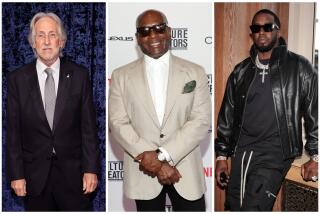Tobacco’s ‘Ultimate Company Man’ Goes Into Battle
- Share via
ST. PAUL, Minn. — If a kinder, gentler tobacco industry appeared in the persons of the chief executives who recently told Congress that yes, smoking is harmful and addictive, then the veteran industry spinmeister who testified Friday in Minnesota’s landmark anti-tobacco case is a colorful remnant of the old guard.
Tobacco Institute Vice President Walker Merryman, who joined the industry lobby group in 1976, was the first hostile witness called by plaintiffs in the trial, in which the state and Blue Cross and Blue Shield of Minnesota are seeking to recover more than $1.7 billion in health-care costs, plus damages for alleged violations of antitrust and consumer protection laws.
Merryman, who serves as the institute’s director of communications, and Michael Ciresi, lead lawyer for the state, fenced for two hours late Friday and will resume combat Monday when the trial enters its fourth week.
For the most part, Merryman was unflappable and smooth, rarely rising to the bait. But Ciresi bristled when Merryman referred to the smoking and health “controversy”--and later got Merryman to admit he quit smoking on the advice of his doctor after a heart attack and bypass surgery.
Over the years, Merryman’s trademark became the acerbic, often witty put-down of smoking research and health groups of every stripe. A doctor’s son who previously worked in TV news in the Midwest, Merryman joined the institute more than two decades ago, when the industry was still saying that varying rates of disease between smokers and nonsmokers could result from constitutional differences.
Vintage Merryman from 1979: “There still is no basic answer to why people who smoke fall victim to some diseases in greater numbers.”
As Big Tobacco’s position evolved to admitting smoking was a “risk factor,” Merryman and his colleagues deftly changed the focus to personal freedom, assaulting tobacco foes as puritanical killjoys and busybodies.
“These maniacal, self-righteous . . . zealots . . . who are so terribly concerned about smoking, about cholesterol, about drinking, about all the possible assaults on our health--one day, they’re going to be surprised when they die of nothing,” he once said.
Or, as Merryman told The Times in the mid-1980s, smokers and others were under siege by “a bunch of little ayatollahs on the march.”
A former industry official, who would not speak if identified, described Merryman, 50, as the “ultimate company man in the old-fashioned sense . . . that he’s willing to go into battle day after day. . . . He’s got all those tapes in his head . . . and they just sort of kick in.”
But in the current phase of the smoking wars in which cigarette makers, desiring peace, want to project a cooperative image, there is “a ‘Lost World’ effect, with Walker sort of the Tyrannosaurus rex loose in modern America,” the former official said.
In questioning Merryman, Ciresi tried to suggest that the institute strove to plant doubt about the health risks, giving smokers the crutch they needed to rationalize their habit.
After getting Merryman to acknowledge that he had never been shown internal industry documents on the addictiveness of nicotine and targeting of teens, Ciresi also suggested that cigarette makers withheld information from their spokesmen to give them “plausible denial.”
As for their current view of the evidence, institute officials, Merryman said, “believe smoking has been statistically associated with diseases, but the cause and effect link has not been shown.”
Ciresi showed him a 1958 document in which three British tobacco scientists, reporting on a visit to industry and independent scientists in America, observed that all but one “believed that smoking causes lung cancer.”
When Merryman insisted that there remains support in the scientific literature for the view that the causal link has not been proven, Ciresi challenged him to name one “organization other than the tobacco industry” that believes this.
“I don’t know who else takes that position, but we certainly do,” Merryman replied. “I don’t know if we have allies, as you put it.”
“Not a single one in the world, do you?” Ciresi shot back.
“I’m not aware of any,” Merryman said.
“Don’t you think, then, it’s fair and reasonable . . . to conclude that there is overwhelming consensus that smoking causes disease, since there’s only one lone soldier and that’s the industry?” Ciresi asked.
“I think people can make up their minds on this and other tobacco issues,” Merryman answered, “and I don’t have to try and make them believe anything.”
Merryman acknowledged that he kicked his long smoking habit after suffering the heart attack while still in his late 40s. He said he decided to eliminate a number of “risk factors” by changing his diet and exercising, along with quitting smoking.
More to Read
Sign up for Essential California
The most important California stories and recommendations in your inbox every morning.
You may occasionally receive promotional content from the Los Angeles Times.












